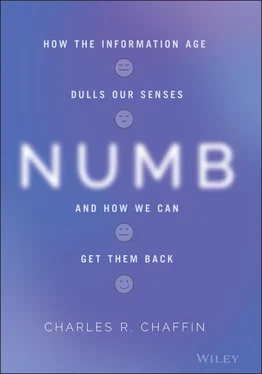We all experience the benefits of this information age, from connecting with others across multiple geographic regions to the accessibility of information, whether news, education, or Wikipedia. Information, and the technology that goes along with it, makes our lives better. We have seen during the COVID‐19 pandemic an ability for some of us to keep working and at least engaging on some level with those we care for most, even if remotely. However, over the course of the last several years (even prior to the pandemic), I started questioning the impact of this information age on many aspects of our lives. I began reflecting on the relationship between information and my biases, habits, and even participation in echo chambers. I started to wonder how we have all of this information at our fingertips (or in our pockets), and yet we seem to be increasingly less informed. I started thinking about the potential impact of our compassion for those closest to us when we are regularly exposed to graphic images of the suffering of others from far away. With the increasing number of choices available to us, I wondered about our ability to navigate so many options, whether choosing a jar of jam or a life partner? I also began to realize the impact of loneliness on people of all ages and questioned how this was possible when social media was such a big part of our lives. The hours per day that we spend on our smartphones scrolling and texting are immense. At the risk of sounding overly dramatic, what happens at the end of our lives when we look back on all of this time? Will we see this engagement as authentic and enhancing our in‐person experiences or will we see it as a waste of time, providing short‐term satisfaction at the expense of long‐term goals and relationships? The answer for each of us is likely different. For me, it seemed as if there was something missing from this engagement. The short‐term dopamine hit was coming at the expense of authentic engagement. The regular access to all the hyperbole, hysteria, and echo chambers began to numb me, making me feel overwhelmed with emotion. Compassion fatigue is only one component of this short yet broad work, but it was the genesis of this book. I began to reflect that the emotion I was feeling from information on the screen was creating a level of apathy in my real life. Essentially, I was hearing about bad news and suffering all day viewing the news and social media, so I didn't need more of it in real life. Real life is where I can make a difference. Real life is the people who are closest to me whom I care about. I needed to better understand this phenomenon so I could be present with them. I wanted authenticity.
That brings us to Numb . My objective with this book was to better understand, and then ultimately outline, the pushes and pulls on our attention in this information age. Perhaps more importantly, I wanted to outline some of the psychological factors that are created through this information age and its impact on our attention. And finally, what is the “so what?” of all of this, meaning what can we do about it to make our lives better in some way, shape, or form? Although Numb is not a novel by any means, it does tell a story of how we so often become engrossed in technology looking for love through likes, swipes, and a host of other bells and whistles. In many cases, we constantly return to social media and many other apps looking for love, attention, and recognition only to fail at finding it. We become addicted to that pursuit, through dopamine loops and habits. If we are not careful, we can find ourselves looking for love from social media, apps, and devices that will never love us back. As you will see with many of the topics, there is an ongoing “chicken or egg” here, where it is unclear whether those who are lonely or struggling with choice are more attracted to their devices or whether time on these devices facilitates loneliness and many of the other factors mentioned throughout the book. If you are looking for a quick answer that summarizes the book, there isn't one (I am not sure I would tell if there was; why read further if the mystery is solved in the introduction?). However, I do think that if you have been thinking about your own relationship with technology and in particular, this information age, you may identify with some of the vignettes and research shared and decide for yourself how it all may be impacting you. I hope that the clinical psychologists, therapists, researchers, and everyday people who were interviewed as part of this book bring value to observation, relevance to research, and hopefully solutions to problems. I am grateful to each of them for their contributions in helping this book become a potential resource. I personally found their insights incredibly helpful to me in my journey towards living in this information age. I hope you will, too.
So let us begin. I hope that Numb satisfies some curiosities when it comes to many of the experiences we all seem to have in this information age. We can be connected and engaged with information without letting it eliminate the authentic experiences that are so important to being human. We can develop ways to eliminate habits that are not serving our long‐term goals and interests. One of the primary themes that seems to emerge throughout the book is the notion that information and technology are at their best when they are tools to something greater. It can bring new experiences and people into our lives in meaningful ways. If managed properly, this information age can help us be more objective and well‐informed regarding issues that affect both us and our communities. The possibilities are endless. It is just a matter of balance, understanding, and empowerment. As you read Numb , I invite you to reflect upon your own experiences in your daily life and decide what's working for you and what isn't – and perhaps ultimately, what needs to change. I hope that Numb empowers you to take control of your attention and use it towards what you think is important, authentic, and fulfilling. We just have to find ways to manage all the information and technology around us, rather than all of it managing us.
CHAPTER 1 The Information Age
Josh is facing a pretty normal Tuesday. The alarm on his smartphone rings at 7 a.m. and as soon as he turns it off, he immediately starts exploring his social media newsfeeds. One Facebook friend posted a picture of a sloppy Big Mac that he ate at McDonald's; another posted that she did not like the newest Netflix series (but is binge‐watching it nonetheless), and Josh's cousin shared a political rant predicting the end of the republic (again). Josh then questions his own selfie on Instagram and wonders if he should have used a filter; it had been two days and not many “likes.” He wonders whether he should take it down. Has his ex seen the picture? Does it look like he's gained weight? Josh then gets lost in a scroll of Instagram posts from friends as well as a slew of strangers whom he follows. He explores all of the vacation pictures that several friends posted and wonders why he hasn't had a vacation like that in years. He asks himself, “How do they find the time and money to travel around the world like that? I wish that were me.”
As a part of his daily routine getting ready for work, Josh listens to the morning news in the background to hear the traffic and weather reports. Another accident on the freeway means either an alternate trip or a late arrival to the office. He asks himself whether he should skip breakfast to make up some of the time. His mind returns to the selfie. Maybe skipping breakfast would be a good idea if he has gained weight. He thinks briefly about what an exercise regimen might look like. He hates running and wonders how much a gym membership might cost. Josh's attention shifts back to the news, where he hears about the pain and suffering from yesterday's typhoon in the Pacific as well as the latest drama unfolding on the set of The Bachelor . He hears the latest report on the market and wonders briefly about the status of his 401(k) and when and if he will be able to retire. He wonders how much longer he can work, and how much longer he wants to work at his current job. Throughout, his attention on the news of the day is intermittent as his mind also wanders to a wide range of topics. Does his youngest really need braces? Should he get a haircut? How should he approach today's meeting with his team?
Читать дальше












